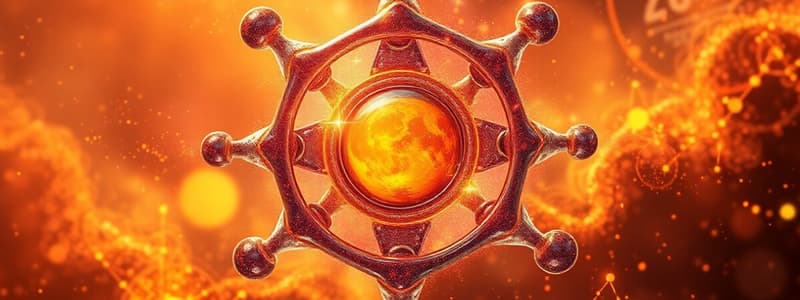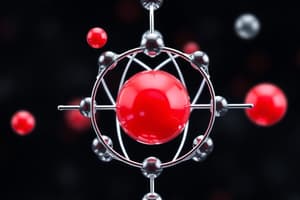Podcast
Questions and Answers
What does the atomic number represent in an atom?
What does the atomic number represent in an atom?
- The number of neutrons in the nucleus
- The total number of protons and neutrons
- The number of protons in the nucleus (correct)
- The total number of electrons in an atom
Which statement is true regarding atomic number and element identity?
Which statement is true regarding atomic number and element identity?
- Different elements can have the same atomic number
- The atomic number changes with the number of neutrons
- All atoms with the same atomic number are the same element (correct)
- Isotopes have different atomic numbers
How are elements organized on the periodic table?
How are elements organized on the periodic table?
- By increasing mass number
- By increasing atomic number (correct)
- By decreasing atomic number
- By the number of neutrons
In a neutral atom, how does the number of protons compare to the number of electrons?
In a neutral atom, how does the number of protons compare to the number of electrons?
What is the atomic number of hydrogen?
What is the atomic number of hydrogen?
Which particles reside in the nucleus of an atom?
Which particles reside in the nucleus of an atom?
What primarily determines an element's chemical properties?
What primarily determines an element's chemical properties?
Which pair of elements is correctly matched with their atomic numbers?
Which pair of elements is correctly matched with their atomic numbers?
How does the number of neutrons affect an atom?
How does the number of neutrons affect an atom?
What is the significance of the mass number?
What is the significance of the mass number?
What does the mass number (A) represent in an atom?
What does the mass number (A) represent in an atom?
How can the number of neutrons in an atom be determined?
How can the number of neutrons in an atom be determined?
What type of elements do isotopes relate to?
What type of elements do isotopes relate to?
What does atomic mass represent?
What does atomic mass represent?
Which of the following calculates the molecular weight of a compound?
Which of the following calculates the molecular weight of a compound?
What is the significance of the atomic number?
What is the significance of the atomic number?
Which of the following is an application of isotopes?
Which of the following is an application of isotopes?
How does the ratio of protons to neutrons affect stability?
How does the ratio of protons to neutrons affect stability?
What is the mass number of carbon-14?
What is the mass number of carbon-14?
Which statement best describes the relationship between atomic number and mass number?
Which statement best describes the relationship between atomic number and mass number?
Flashcards are hidden until you start studying
Study Notes
Atomic Structure: Fundamentals
- Atoms are composed of three subatomic particles: protons, neutrons, and electrons.
- Protons are positively charged and are located in the nucleus of the atom.
- Neutrons are neutral particles (no charge) also located in the nucleus.
- Electrons are negatively charged particles that orbit the nucleus in electron shells.
Atomic Number (Z)
- Definition: The atomic number represents the number of protons in the nucleus of an atom.
- Significance:
- Element identity: The atomic number uniquely defines an element.
- Periodic table placement: Elements are arranged on the periodic table in order of increasing atomic number.
- Charge balance: In a neutral atom, the number of protons equals the number of electrons.
Mass Number (A)
- Definition: The mass number is the sum of the number of protons and neutrons in the nucleus of an atom.
- Calculation: A = Z + N, where Z is the atomic number, and N is the number of neutrons.
- Isotopes: Atoms of the same element with the same number of protons but different numbers of neutrons have different mass numbers.
- Atomic mass: The atomic mass of an element is the weighted average of the masses of all its naturally occurring isotopes.
Relationship Between Atomic Number and Mass Number
- Determining neutrons: The number of neutrons in an atom can be determined if the atomic number and mass number are known using the formula: N = A - Z.
- Nuclear stability: The ratio of protons to neutrons affects the stability of an atom's nucleus. Atoms with too many or too few neutrons relative to protons may be unstable.
Applications of Atomic Number and Mass Number
- Element and isotope identification: The atomic number is used in identifying elements and isotopes.
- Molecular weight calculation: The atomic mass is used to calculate the molecular weight of compounds.
- Nuclear chemistry: Understanding atomic number and mass number is crucial for understanding nuclear reactions, including fission and fusion, and radioactive decay.
Studying That Suits You
Use AI to generate personalized quizzes and flashcards to suit your learning preferences.




